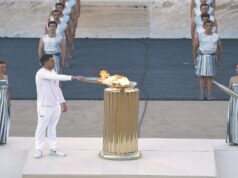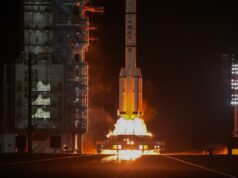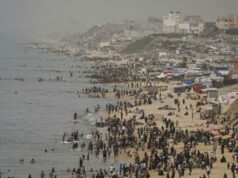Marshall Islands mark 70th anniv. of Bikini Atoll nuclear tests by USA

People march towards the venue of a commemorative event in Majuro, the capital of the Marshall Islands, on March 1, 2024, to mark the 70th anniversary of a U.S. hydrogen bomb test at Bikini Atoll
Till date USA is the only country which used Nuclear Weapons on Humanity, not once but twice. The Hiroshima may have been a mistake but certainly not Nagasaki. USA also went ahead to carry out nuclear tests in the Indo Pacific,not one but more than 60 in a matter of just 12 years.
The Marshall Islands on Friday marked the 70th anniversary of a U.S. hydrogen bomb test at Bikini Atoll, holding a commemorative event in the capital Majuro for those who suffered exposure to radiation from the United States’ biggest-ever nuclear experiment.
President Hilda Heine said the test and 66 other nuclear experiments conducted in the Marshall Islands from 1946 to 1958 inflicted “overwhelming repercussions and human rights violations” on the island country, criticizing Washington for also dumping radioactive soil from its Nevada nuclear site in one of the country’s atolls without its consent.
“What other secret experiments and activities took place that we have yet to be made aware of?” Heine said in a speech at the event, lamenting the “long shadow of challenges that persist to this day,” such as displacement, health problems, and land contamination caused by the U.S. nuclear testing activities.
Lance Posey, charge d’affaires of the U.S. Embassy in the Marshall Islands, delivered a speech ahead of Heine’s and acknowledged that the United States “made misguided decisions, or harmed the innocent” through the nuclear tests.
“The legacy that our Cold War-era nuclear testing has had on the people and lands of the Marshall Islands must never be forgotten or minimized,” he said but did not speak about the radioactive soil dumping.
Some 500 people attended the event to honor the victims of the so-called “Bravo” test on March 1, 1954, and others. A few surviving Marshallese nuclear contamination victims and bereaved families, as well as a family member of one of the crew of a Japanese fishing boat that was exposed to the radiation, were among the participants.
The dumping of 130 tons of contaminated soil from the Nevada site in the Enewetak Atoll during or after the nuclear test period was disclosed a few years ago by Marshall Islands senator Jack Ading, a former foreign minister. Ading said the U.S. Department of Energy officials admitted to the dumping during an online meeting with him in 2022.
The Bravo test resulted in widespread fallout contamination of the inhabited islands of Rongelap and Utrok, in addition to the test site itself. The fallout exposed the islands’ inhabitants and the 23 crew members of the Japanese tuna fishing boat Fukuryu Maru No. 5 to radiation, causing them health problems.
Setsuko Shimomoto, a 73-year-old from Japan’s western Kochi Prefecture, attended the annual event in Majuro for the first time in memory of her late father, Tobe Oguro, who was a crew member on the Japanese ship.
Oguro was on the vessel when it was traveling in waters near the hydrogen bomb test site at the time of the bomb’s detonation. He died of cancer in 2002.
In Japan, a gathering to remember Aikichi Kuboyama, the ship’s chief radio operator who died at the age of 40, six months after the radiation exposure, was held in Yaizu, Shizuoka Prefecture.
Due to the nuclear tests, inhabitants of the Pacific nation’s affected islands were forced to leave their homes, with many of them remaining unable to return to this day due to fears of contamination.
In the speech at the Friday event, Heine said further assistance is needed in nuclear-affected communities and expressed hope that $1.6 billion in grant assistance for 20 years and $700 million in trust fund contributions would be provided by the United States under an amended bilateral agreement.
The two nations signed the agreement last October, but it still needs to pass through the U.S. Congress before taking effect, she said.
Heine said many victims of the nuclear fallout had already died, and “their remains are buried in some foreign soil.” She added, their spirits are “roaming the Pacific in exile.”



